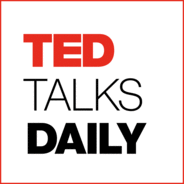We've all heard that robots are going to take our jobs -- but what can we do about it? Innovation expert David Lee says that we should start designing jobs that unlock our hidden talents and passions -- the things we spend our weekends doing -- to keep us relevant in the age of robotics. "Start asking people what problems they're inspired to solve and what talents they want to bring to work," Lee says. "When you invite people to be more, they can amaze us with how much more they can be."For a chance to give your own TED Talk, fill out the Idea Search Application: ted.com/ideasearch.Interested in learning more about upcoming TED events? Follow these links:TEDNext: ted.com/futureyouTEDSports: ted.com/sportsTEDAI Vienna: ted.com/ai-viennaTEDAI San Francisco: ted.com/ai-sf Hosted on Acast. See acast.com/privacy for more information.

Bildung
TED Talks Daily Folgen
Want TED Talks on the go? Everyday, this feed brings you our latest talks in audio format. Hear thought-provoking ideas on every subject imaginable – from Artificial Intelligence to Zoology, and everything in between – given by the world's leading thinkers and doers. This collection of talks, given at TED and TEDx conferences around the globe, is also available in video format. Hosted on Acast. See acast.com/privacy for more information.
Folgen von TED Talks Daily
2486 Folgen
-
Folge vom 11.10.2017Why jobs of the future won't feel like work | David Lee
-
Folge vom 10.10.2017The forgotten art of the zoetrope | Eric DyerArtist Eric Dyer spent years working at a computer to produce images for the screen. Longing to get his hands back on his work, he began exploring the zoetrope, a popular 19th-century device that was used to create the illusion of motion long before the arrival of film. In this vibrant talk, he showcases his resulting art inventions: spinning sculptures and that evoke beautiful, dreamlike scenes. (Warning: This talk includes flashing images and lights. Those who are photosensitive or have seizures trigged by strobes are advised to avoid.)For a chance to give your own TED Talk, fill out the Idea Search Application: ted.com/ideasearch.Interested in learning more about upcoming TED events? Follow these links:TEDNext: ted.com/futureyouTEDSports: ted.com/sportsTEDAI Vienna: ted.com/ai-viennaTEDAI San Francisco: ted.com/ai-sf Hosted on Acast. See acast.com/privacy for more information.
-
Folge vom 10.10.2017Electrical experiments with plants that count and communicate | Greg GageNeuroscientist Greg Gage takes sophisticated equipment used to study the brain out of graduate-level labs and brings them to middle- and high-school classrooms (and, sometimes, to the TED stage.) Prepare to be amazed as he hooks up the Mimosa pudica, a plant whose leaves close when touched, and the Venus flytrap to an EKG to show us how plants use electrical signals to convey information, prompt movement and even count.For a chance to give your own TED Talk, fill out the Idea Search Application: ted.com/ideasearch.Interested in learning more about upcoming TED events? Follow these links:TEDNext: ted.com/futureyouTEDSports: ted.com/sportsTEDAI Vienna: ted.com/ai-viennaTEDAI San Francisco: ted.com/ai-sf Hosted on Acast. See acast.com/privacy for more information.
-
Folge vom 09.10.2017How Africa can use its traditional knowledge to make progress | Chika Ezeanya-EsiobuChika Ezeanya-Esiobu wants to see Africans unleash their suppressed creative and innovative energies by acknowledging the significance of their indigenous, authentic knowledge. In this powerful talk, she shares examples of untapped, traditional African knowledge in agriculture and policy-making, calling on Africans to make progress by validating and dignifying their reality.For a chance to give your own TED Talk, fill out the Idea Search Application: ted.com/ideasearch.Interested in learning more about upcoming TED events? Follow these links:TEDNext: ted.com/futureyouTEDSports: ted.com/sportsTEDAI Vienna: ted.com/ai-viennaTEDAI San Francisco: ted.com/ai-sf Hosted on Acast. See acast.com/privacy for more information.
